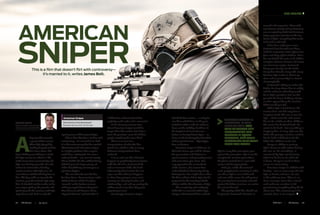
American Sniper Trial of War
- 1. MAY 2015 | IPA Review 5352 IPA Review | ipa.org.au American Sniper Directed by Clint Eastwood Released January 2015, 132 minutes A boy stumbles towards a group of US marines. Chris Kyle (played by Bradley Cooper) watches him from above. The boy is holding something in a cloth, but Kyle cannot see what it is. The cloth comes loose momentarily and Kyle sees the boy’s grenade. He calls to base for instruction, but they cannot confirm what Kyle sees. He must choose whether the boy lives or dies. The boy walks on towards the marines, grenade in hand. Kyle stops him. A shocked mother rushes to her son, only to pick up the grenade and sprint towards the marines until Kyle stops her as well. And so ends the opening scene of American Sniper. This is film that does not flirt with controversy—it’s married to it. And it is that controversy that has vaulted Clint Eastwood’s American Sniper to a higher platform than anyone could have anticipated. It is now a cultural divide—one cannot merely like or dislike the film without being labelled part of a larger group, of either bloodthirsty warmongers or spineless hippies. The war of words over the film has been fierce. ‘Documentary’ maker Michael Moore called all snipers ‘cowards’ on his Twitter account, which prompted former Navy Seal Don Mann to call Moore’s claims ‘beyond ludicrous’ and state that ‘it is difficult to understand just how anybody could make such a comment.’ A list of every extreme view about American Sniper would be longer than this article, but it does raise the question: were all of these people watching the same film? There is no one true interpretation of what the film stands for, which is why so many different interpretations have surfaced. Is it an anti-war film that just happens to graphically demonstrate, with the aid of an electrical drill and an innocent child, the dark inhumanity of terrorists? Or is it a pro-war film that just happens to show how going to serve one’s country can destroy families and relationships, and end up costing the soldier much more than they were expecting to lose? Amazingly, American Sniper tells both these stories—a rarity for war films which have, in the past, tended to either make its audience focus on the nobility of soldiers in the toughest of circumstances— Patton or Saving Private Ryan—or focus on the dark tragedy of conflict and its pointlessness—Apocalypse Now or Platoon. American Sniper is different. In this trial of war, you will be shown the prosecution and defence in equal measure, and your judgement will come from you alone. You may appreciate the camaraderie of the marines, but mourn how each individual’s humanity slowly disintegrates. You might cheer when the film’s villains fall to Kyle, but be prepared for the inextinguishable villains within the character of Kyle. The complexity and ambiguity of the film is mirrored within Kyle. Cooper and Eastwood have realised Kyle in a way that, once again, goes against the convention. Kyle is not the complete GI. Joe hero upon whom the plot is centred; he is a man with serious and damaging faults. And yet, unlike the tortured souls grappling for meaning in other war films, Kyle is sure of himself and sure of his cause: he will protect his country from terrorists and will protect his fellow marines, no matter the cost to himself. The quality of the film should not be ignored. Eastwood’s direction is assured and impressive. Films with two focuses usually end up favouring one or neglecting both, but American Sniper pays due attention to the two fronts it fights. Everything that needs to be said is said well. It has been eight years since Eastwood last directed war films, with his impressive Letters from Iwo Jima and Flags of Our Fathers. Time has not dulled his tools at all. With a complete absence of score and smart use of camera angles, Eastwood brings you firmly into the battle. Every door-knock, every raid, every decision Kyle makes is shown up close and so personally it is almost claustrophobic. Eastwood’s ability to realise the battles for Iraq allows him to subtly ask his audience what they would do in Kyle’s position. You see the grenade the boy is holding and you see him approaching the marines. What would you do? When Kyle is back home, the tension does not fall away but re- imagines itself. The war is over for Kyle—what now? His wife wants him to be a father to their children. She wants her husband back. He wants to be back—but something is stopping him. In Iraq, Kyle was the father the younger marines needed, but he finds it difficult to be the father his children need now. Cooper’s ability to portray Kyle’s desire to take action during the war, to ‘do something’, is countered by Kyle not knowing what it is he has to do when he is home. Cooper’s work in these scenes is outstanding. American Sniper is riddled with duality—war as necessary and evil, Kyle as heroic and torn. So, too, is the audience torn. There is no clear ‘message’ from this, instead each audience member is left questioning everything they think about war. The controversy it has created, then, is no surprise. R JAMES BOLT Communications Coordinator at the Institute of Public Affairs FILM REVIEW R AMERICAN SNIPERThis is a film that doesn’t flirt with controversy— it’s married to it, writes James Bolt. AMERICAN SNIPER IS DIFFERENT. IN THIS TRIAL OF WAR, YOU WILL BE SHOWN THE PROSECUTION AND DEFENCE IN EQUAL MEASURE, AND YOUR JUDGEMENT WILL COME FROM YOU ALONE. >